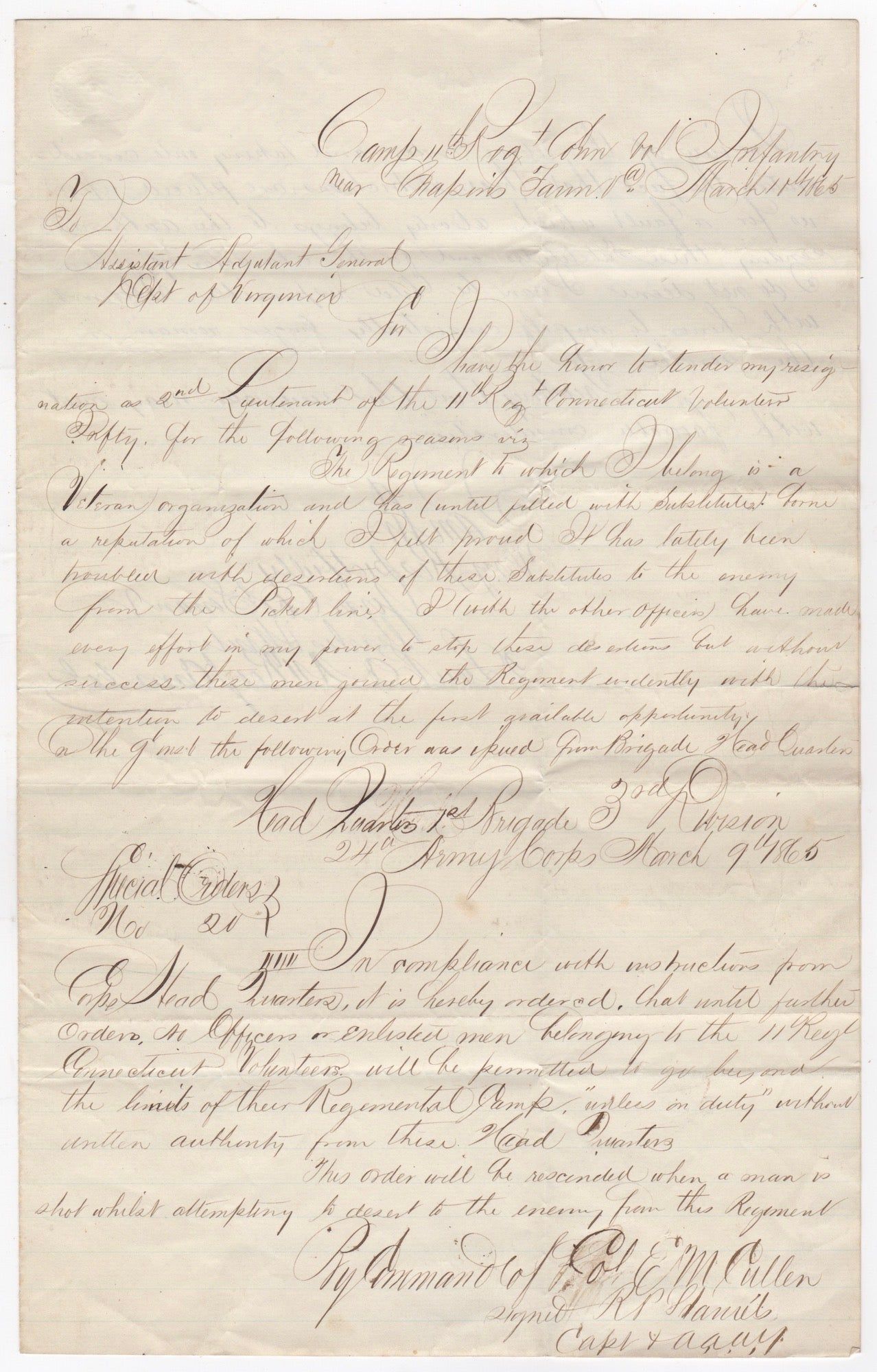[Manuscript Resignation and Transmission of Orders] from Charles H. Winter, 2nd Lieutenant of the 11th Regiment of the Connecticut Volunteer Infantry, Pertaining to the Desertions of Recently Enlisted Substitutes
- SIGNED
- Chapin's Farm [Chaffin's Farm], VA , 1865
Chapin's Farm [Chaffin's Farm], VA, 1865. Very good, light creasing, closed tear along centerfold, minor soiling and ink staining, contents clean.. [2] pp. Bifolium. 8 x 12.5 inches. Even before the secession of the southern states, the people of Connecticut were divided regarding their views of the war effort. Throughout the military conflict, the social and political tensions were consistently exacerbated by incongruous perspectives on abolition and emancipation.
This document demonstrates how, even in the final weeks of the war, northern sympathy for the Confederacy remained prevalent. Dated March 11th, 1865, Charles H. Winter tenders his resignation as 2nd Lieutenant of the 11th Regiment of the Connecticut Volunteer Infantry, due to the increased instances of desertions by substitutes. He tells the Assistant Adjutant General, "The Regiment to which I belong is a Veteran organization and has (until filled with Substitutes borne a reputation of which I felt proud It has lately been troubled with desertions of these Substitutes to the enemy from the Picket Line. I (with the other officers) have made every effort in my power, to stop these desertions but without success these men joined the Regiment evidently with the intention to desert at the first available opportunity." Below Winter's explanation is the transmission of Special Order, No. 201, issued by Colonel Edgar M. Cullen (1843-1922), of the 24th Army Corps (March 9th, 1865). Cullen's orders prohibit any of the men belonging to the 11th Regiment to leave the confines of the encampment the written permission from his Head Quarters.
In his closing, Winter places blame elsewhere, noting that "these restrictions are placed upon us for a fault which clearly belongs to the authorities sending these Substitutes and for the character of whom I do not deem I can be held responsible..."
This document demonstrates how, even in the final weeks of the war, northern sympathy for the Confederacy remained prevalent. Dated March 11th, 1865, Charles H. Winter tenders his resignation as 2nd Lieutenant of the 11th Regiment of the Connecticut Volunteer Infantry, due to the increased instances of desertions by substitutes. He tells the Assistant Adjutant General, "The Regiment to which I belong is a Veteran organization and has (until filled with Substitutes borne a reputation of which I felt proud It has lately been troubled with desertions of these Substitutes to the enemy from the Picket Line. I (with the other officers) have made every effort in my power, to stop these desertions but without success these men joined the Regiment evidently with the intention to desert at the first available opportunity." Below Winter's explanation is the transmission of Special Order, No. 201, issued by Colonel Edgar M. Cullen (1843-1922), of the 24th Army Corps (March 9th, 1865). Cullen's orders prohibit any of the men belonging to the 11th Regiment to leave the confines of the encampment the written permission from his Head Quarters.
In his closing, Winter places blame elsewhere, noting that "these restrictions are placed upon us for a fault which clearly belongs to the authorities sending these Substitutes and for the character of whom I do not deem I can be held responsible..."


